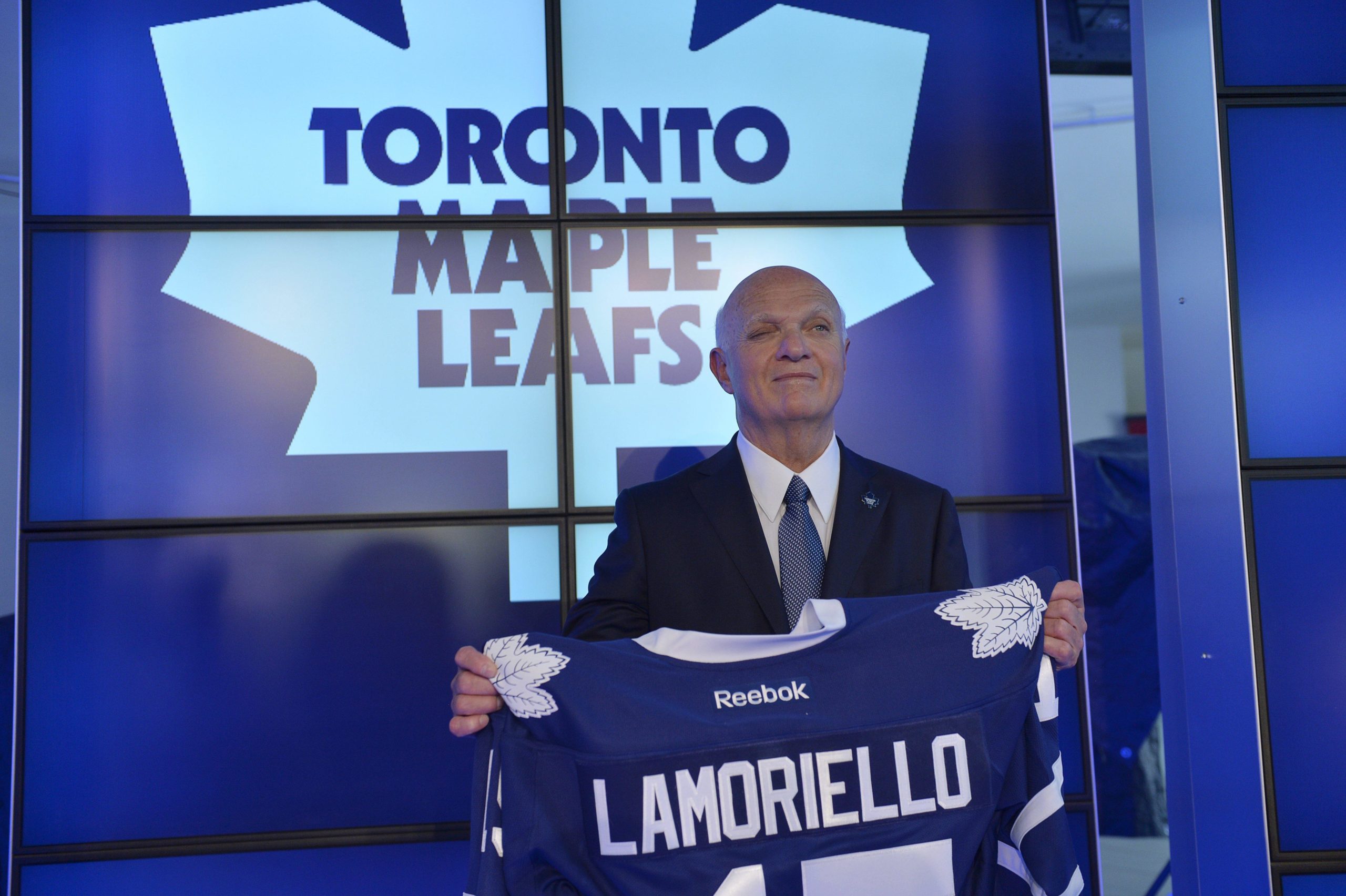Toronto Maple Leafs general manager Lou Lamoriello joined TSN Drive with Dave Feschuk and Steve Simmons on Friday afternoon. Full transcript below.
Steve Simmons: Let’s go back to the first phone call you got from Brendan Shanahan. He made a phone call and he said, “Lou, I have this idea. I’m interested in you coming to the Maple Leafs.” Your thoughts that day?
Lou Lamoriello: First of all, he asked for permission from the ownership, Josh Harris and David Blitzer, and I received a phone call from them that Brendan had reached out to them. At that point, I certainly wasn’t interested or even had given it a thought, but because it was Brendan and the relationship we’ve had, I certainly wanted to respond to him. He basically said, “Listen, I don’t want a response, I just want you think about something. Just put a thought in your mind,” and then he went on to another subject. I received another phone call and eventually I found myself in Toronto.
Simmons: What was it about his pitch, his conversation, your situation in New Jersey, that made it time for your after 28 years, after building a team really in your own image, that you could pick up and leave?
Lamoriello: First of all, the word that I said to Brendan when we first spoke was intriguing; the way he presented it. After a period of time, there was a thought process because of different things going on in New Jersey. I started to think about it, and actually got excited about it, at what Brendan was creating here and the type of people he had put together. I certainly have known Mike – have tremendous respect for him, [I] have always had that, [I] competed against him in a Stanley Cup. Also, I knew Hunter, I knew Kyle, I knew these people, and who they were, and Brendan. In my mind, I said this is quite the group that he’s got. I certainly knew Brendan and then Mr. Tanenbaum met me for dinner and spoke to me to tell the thought process that he had and the support they were giving for the Maple Leafs. That’s what led to it. Just things built up, sort of snowballed, and finally a decision was made.
Dave Feschuk: Speaking to people around the hockey world since you were hired, there has been a lot of surprise that you were hired. Some of the executives I’ve talked to have said, “look, it’s a very unconventional situation to hire a GM after you’ve hired a coach, after you’ve hired that GM’s assistants. To trade the best player in the franchise before you hire the General Manager; all of it is very unconventional.” Why should Leafs fans believe it will work?
Lamoriello: I’m not here to convince anybody one way or the other. I think all of us have a responsibility. I did not look at that as an negative whatsoever. In fact, I looked at it as a positive, and really, in mind, commended Brendan on the type of individuals he did hire and the roles they were to play and what he had asked me to do. If I had the reverse of that, these are probably the top people that I would’ve gone after. And because Brendan did it and they were in place, why do you look at in another way? I think everybody has to be comfortable in their own skin with what they can bring or what they can do. I guess the respect I had for these individuals and the security they had in their own minds for their jobs, it was, as I said, intriguing and exciting.
Simmons: How different will it be for you to operate when there is somebody above you that you need to discuss everything with, when you have a larger staff than you’re used to having, and more voices in the organization? How much of a change will it be for you personally?
Lamoriello: As far as discussing something above, you always discuss everything you’re doing with the people around you. I think the personality and the style that I am and have been used to is just that you don’t discuss it publicly, but you are always interacting and relying on the people around you, whether they’re above you or side by side with you. If not, you are never going to have any success. I had that in New Jersey. None of that, to me, was a negative. It’s the type of individuals that you are working with, the type of assets they have within them, the knowledge that it brings, and also the competitiveness of pushing each other. I think that’s what it’s all about. When you’re working with intelligent people, people who know how to win, people who have won, and people who are committed to winning, what more can you really ask?
Feschuk: You made an intriguing hire not long ago bringing in Jacques Lemaire as a special assignment coach. Of course, Lemaire is known as one of the pioneers – if not one of the pioneers, one of the great users of the trap. Of course, your head coach Mike Babcock is known for being synonymous with possession style hockey. What kind of hockey do you want to see the Toronto Maple Leafs play?
Lamoriello: First of all, that’s an interesting hire because Mike and I were having a conversation. Jacques Lemaire came up, and he said, “what is Jacques doing now that you’re not in New Jersey?” I said, “well, there have been several clubs that have been speaking with him.” He looked at me — Mike that is — and said, “Why are we letting him speak to other clubs? You know the respect I have for him. I know the respect you have.” Mike went in his office and Mike immediately called Jacques and told Jacques that he’d love to have him consider coming here. I called him after that and Jacques’ here. That’s how that transpired. They worked with each other in the Olympics and the mutual respect they have, certainly it’s known the respect that I have for Jacques. So that’s how that came [about].
As far as the style, that’s going to be Mike’s decision. I think we all know the plan that’s here. I think we all know it’s not something that’s not coming tomorrow, but there is a plan, there is an internal plan. Everyone in this organization has brought into it and will stick with it. I can assure you that, once that puck is dropped, no one is going to coach to win more than Mike Babcock.
Simmons: Lou, some old friends of yours, some very good hockey people – Pat Quinn, Cliff Fletcher, Brian Burke, Dave Nonis — have all attempted the job that you are now in. Some had some success; none of them sustained success. Why has it been so difficult to win in Toronto?
Lamoriello: I could not answer that, Steve. I have not been here but three weeks. Really I haven’t even given that a thought. All I’ve done is focus on the things I have control of. I’m like a sponge trying to get as much information from each individual here; trying to learn as much as I can about the players we have here about the people I’m working with each and every day. Get up to speed on the scouting staff; all of the things that you need to have success. I’m just trying to educate myself as much as possible. As far as wondering why, and why not, I don’t waste any time on things I can’t control or that really have no bearing on what I’m trying to do.
Simmons: I know that Mike has touched base with all of the players as of now. What is your plan, or have you reached out to you players? Do you plan on meeting with them before camp? How much of the Leafs have you watched on tape since you were hired?
Lamoriello: I have reached out to, I’d say, 75% of the players on the phone. Just introduced myself, nothing other than really expressing exactly what I said when I first came here – excitement to work with them, and that I’m not concerned about anything that’s happened in the past. I really am the type of person who has no preconceived notions when he goes into something, and I’m going to have an open mind on everything that transpires.
As far as how much tape — not as much as I’d like. I think I am doing all the things that I want to do to get out of the way that become normal. Certainly now going forward, Mike and his staff, that’s all they’ve been doing. Training camp is really going to tell me what I want to know about players.
Simmons: Lou, will you be making any more personnel changes in the front office? And is there a chance David Conte, your long time assistant, will be working for the Maple Leafs soon?
Lamoriello: Right now, there is no intention of making any changes anywhere. I feel the same way about the front office, who I have been extremely impressed with, A to Z. I think that, whenever you come into a situation — and I have done this on a couple of occasions, whether it be at Providence College going from coach to athletic director, or going from that position to New Jersey, and New Jersey to the Nets — I’ve always gone in [like] I’ve hired those people who are there. Not looking to make changes; they determine whether changes are made. I can tell you that what I’ve seen right now, in this period of time I’ve been here, I’m very fortunate with the people who are here.
Feschuk: Lou, your success with Devils is well documented; three Stanley Cups during your run since 1987. But, since the salary cap was instituted in 2005 — you had that great Cup run in 2012, but outside that Cup run you’ve only had two playoff series wins with the Devils. There are those who say you didn’t really manage the salary cap era very well. Do you think that’s fair, and how do you think you can bring what you learned in your time in New Jersey to the Leafs?
First of all, I really don’t pay any attention to what people think or don’t think. I don’t mean that in any criticism or sarcasm because only I know, in the seat that I sit in, what I think the reasons are and I certainly do not look for excuses. We learn in everything we do. If we don’t learn everyday or strive to learn, then we certainly shouldn’t be doing the job that we do. I certainly have more questions than answers on anything I approach. In New Jersey, we did get it back, we did make that run; we lost two quality of players of pretty good stature, and then we made the decision to turn and to start rebuilding – the word I hate. I say restructure, starting from the goaltending out and making the trade for Cory Schneider, and the decision to draft in the last five years defencemen, who I believe you build a team through. I think that the Devils have a really solid foundation. If you look at the cap going into this season, it’s one of the lowest in the League to allow them to take care of these defencemen as they grow, and also the salaries of the three top forwards are already in place so that they can sustain going forward in building. I think we’ve learned from a lot of things that have transpired. Have we made mistakes? Absolutely. I think we all have. Right now, all I can do is learn from that, or take what we did right and go forward.
Feschuk: You say you hate the word rebuilding. How would you describe what the Leafs are doing right now?
Lamoriello: I think it’s rebuilding, but I do hate the word. I’m not going to apologize for it because I think we’re in this business to win, we’re in this business to win every night. Right now, we do have a plan to grow a little slower and not get teased by any immediate success here or there. I believe that the fans, from all the people I’ve talked to, want this build so that we can make those long runs that you’ve seen certain organizations make. I bought into that, I feel very comfortable with it, and as I’ve said I’m excited about it.
Simmons: What, if anything, do you like about this Maple Leafs roster?
Lamoriello: I don’t know enough about it to make that type of comment. I’ll know more about that at the end of September and October.
Feschuk: When you talk to people around this team, around this city really, about your new management team, the thing that comes up is, “hey, Lou Lamoriello, very sure of himself, obviously big accomplishments, big ego. Mike Babcock; very sure of himself, big ego. Brendan Shanahan; very sure of himself, big ego.” The question becomes: how are all these egos going to co exist? How do you think it will work?
Lamoriello: First of all, I don’t know what you mean by the definition of ego, but let’s put that aside. There’s no question [there is] the perception that the three of us [are] strong individuals. All I’d ask is, what’s wrong with that? I think the three of us have experienced what it takes to win. What’s wrong with that? The three of us have mutual respect for each other or we would not be here. What’s wrong with that? The final conclusion is I’d say I’m excited to work with both of them. I know both of them; I know what they bring. The end result is what we’re all striving for.
Simmons: In New Jersey, the Devils were known as a most unique organization, certainly an organization you built from ’87 on. There was a certain way, there were certain rules, there were certain codes of conduct. How much of the Devils way, and I don’t mean on ice as much as off, do you plan on bringing to the Maple Leafs?
Lamoriello: The first and most important word, and it’s synonymous with all of us here in this organization, is we have to bring an accountability here with players, not only on the ice but off the ice [just] as much. There is a responsibility that has to be followed through, whether you win, lose or tie. We all believe in that.
As far as specific rules, or whatever, I don’t think they’ll be all of what New Jersey has done in the past, all of what maybe Detroit has done in the past, all of what certainly Toronto has done. It will be a combination of a lot of the things that are best for the situation we’re in [in order] to grow. You just can’t turn things right away. Plus, change is good sometimes. That is what I think is what will be something that people like yourself, or the media, will have to wait and see how we can adapt to each other and make changes for the good of the team. The key will be the most important thing is what is best for the Toronto Maple Leafs hockey team, and that’s what we have to find out.
Simmons: Our last question, from our friends on Twitter: Do you plan on living in Toronto?
Lamoriello: Yes, I am definitely going to live in Toronto. I’m in the process of making a decision — do I buy, do I lease? And trying to find out the tax laws and all the things that go with that, but I will definitely move to Toronto.


































